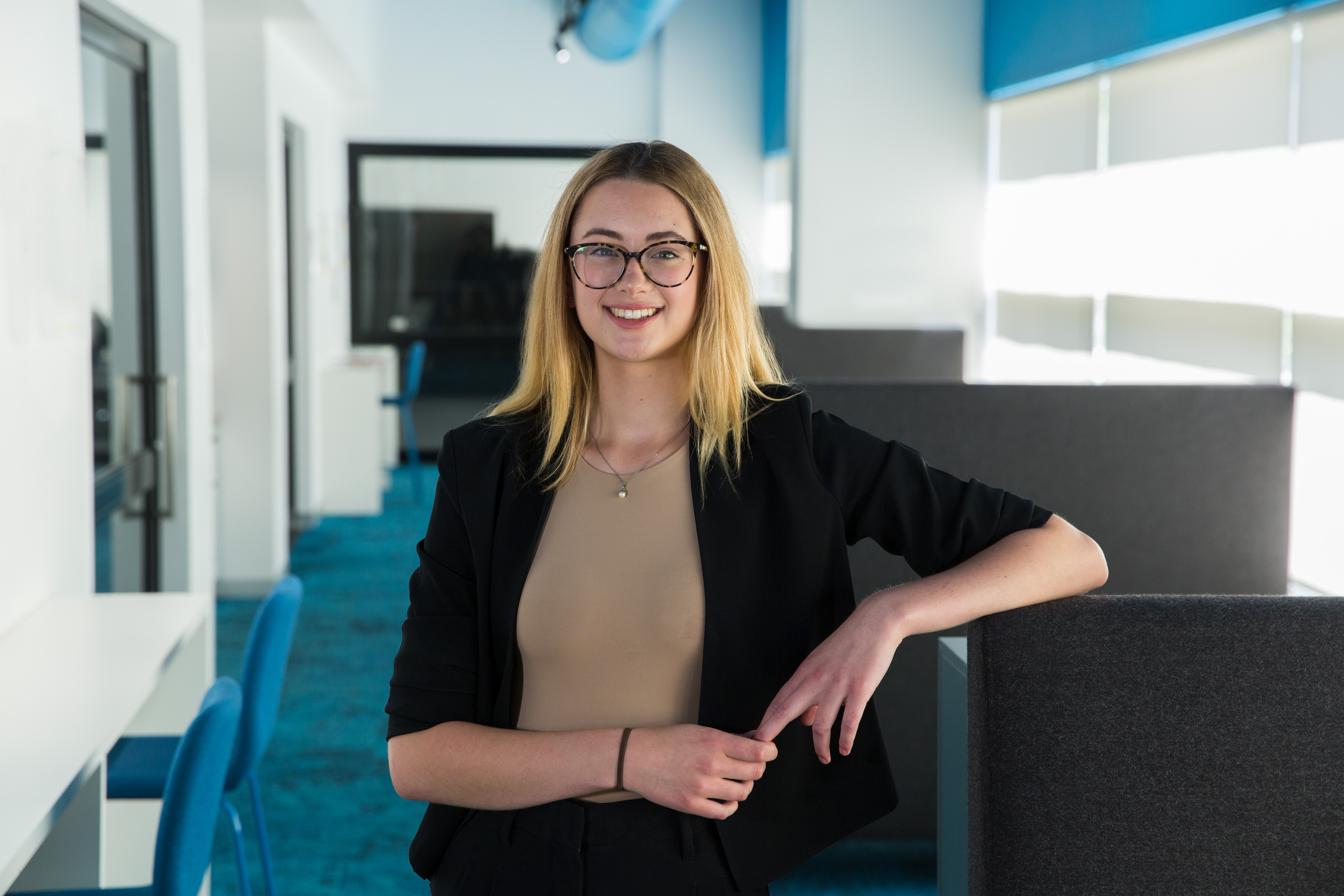Swinburne Law student develops legal tech solution for Spotify

Third year law and engineering student, Nicola Jerkovic, competed in the international Law Without Walls competition to develop a tech solution prototype for the legal team at Spotify.
In summary
- Swinburne Law School student Nicola Jerkovic collaborated with a team of law students from around the world to develop a search engine extension for Spotify’s legal team
- Lighthouse is a legal technological solution for Spotify’s licensing team that helps teams find contracts quickly and easily
- The project was part of the international Laws Without Walls competition
Third-year Swinburne law student, Nicola Jerkovic, has worked with law students around the world to develop an innovative technology solution for the legal team at audio streaming platform Spotify, as part of the international Laws Without Walls (LWOW) competition.
The four-month competition brings together students from law schools around the world to design technology solutions and prototypes that address real world legal problems facing organisations. It aims to build the skills and knowledge of aspiring lawyers about the practical application of innovation and technology in the law.
Finding a tech solution
Nicola, who is studying a Bachelor of Laws / Bachelor of Engineering (Honours), worked with an international team of law students to develop a search engine extension for Spotify’s licensing team, called Lighthouse.
Lighthouse enables Spotify’s legal team to find contracts quickly and easily, instead of using the current time-consuming process which had no naming conventions and was only managed by on person, enabling the loss of important information. The search engine extension synthesises data by extracting information stored in contract management tools to make contract discovery faster and simpler.
Nicola describes it as an innovative user-interface design that helps lawyers ‘intelligently and efficiently search for documents.’
‘Working with Spotify was innovative and fresh. Everyone was friendly and eager to collaborate regardless of experience,’ says Nicola.
At the end of the four months, Nicola and her team pitched their solution to a panel of judges which included the Chief Legal Officer at Spotify who congratulated them on their achievement.
Director of the Bachelor of Laws, Mitchell Adams mentored Nicola’s team during the competition and says the team found a solution to a ‘very real’ problem of productivity loss faced by legal teams around the world. ‘The Lighthouse solution is truly innovative with the potential to have an impact on a global scale.'

Nicola and her team presented their pitch online at the LWOW Competition to panel of judges, including the Chief Legal Officer of Spotify.
Overcoming obstacles
Nicola says the experience was not without its challenges, due to evolving feedback and organising a large team located all around the world and working at different hours of the day. However, she says that overwhelmingly the competition acted as ‘training-wheels in the professional space’ that developed her skills immensely.
The experience helped Nicola gain a deeper understanding of communication, the global legal marketplace and how innovation is impacting the work, expectations, and careers of legal professionals. She says her team was committed to ensuring all participants were engaged and had a good time throughout the competition.
‘Spirits were always high, and we were always able to have a laugh together,’ she says.
During the competition, Nicola drew upon what she had learnt at Swinburne, particularly in the Law School’s Legal Technology and Innovation unit, which gives students insight into the relationship between law and technology, and how the legal industry is adapting to new technologies.
Nicola says Swinburne Law School provides ‘closer relationships with lecturers and more professional opportunities within a tight-knit group of students’, which helped her prepare for the competition. In addition, she also participated in programs like the ANU Journal of Law and Technology (ANUJOLT) Hackathon with other law students, and ‘loved the challenge and process’ too.
-
Media Enquiries
Related articles
-

- Technology
- Science
- Engineering
Victorian students drive green energy transition through international hydrogen competition
Swinburne’s KIOSC, in collaboration with Horizon Educational and Gippsland Tech School, co-hosted the Hydrogen Grand Prix in Melbourne.Friday 26 July 2024 -

- Law
Supreme Court Prize awarded to top Swinburne graduate
Outstanding Swinburne Bachelor of Laws graduate, Harrison Cant, has been awarded the Supreme Court Prize by Chief Justice the Hon Anne Ferguson, as one of the top students in Victoria.
Friday 19 July 2024 -

- Technology
- Health
New MedTechVic prototypes to transform everyday lives of people with a disability
Swinburne’s MedTechVic has revealed three new prototypes designed through the joint Health-led Manufacturing Innovation Program, in partnership with the Australian Medtech Manufacturing Centre and Safer Care Victoria
Friday 19 July 2024 -

- Business
- Technology
Swinburne’s Luminate Pitch Night 2024 advances innovative ideas for a better world
Swinburne’s 2024 Luminate Pitch Night showcased market-ready ideas from 10 founders
Wednesday 12 June 2024 -

- Health
- Technology
Clinical Innovation Fellowships develop creative solutions to Australia’s healthcare challenges
MedTechVic is gearing up to begin its fourth year of the Clinical Innovation Fellowship Program (CIFP), following the highly successful third round in 2023.
Wednesday 19 June 2024

